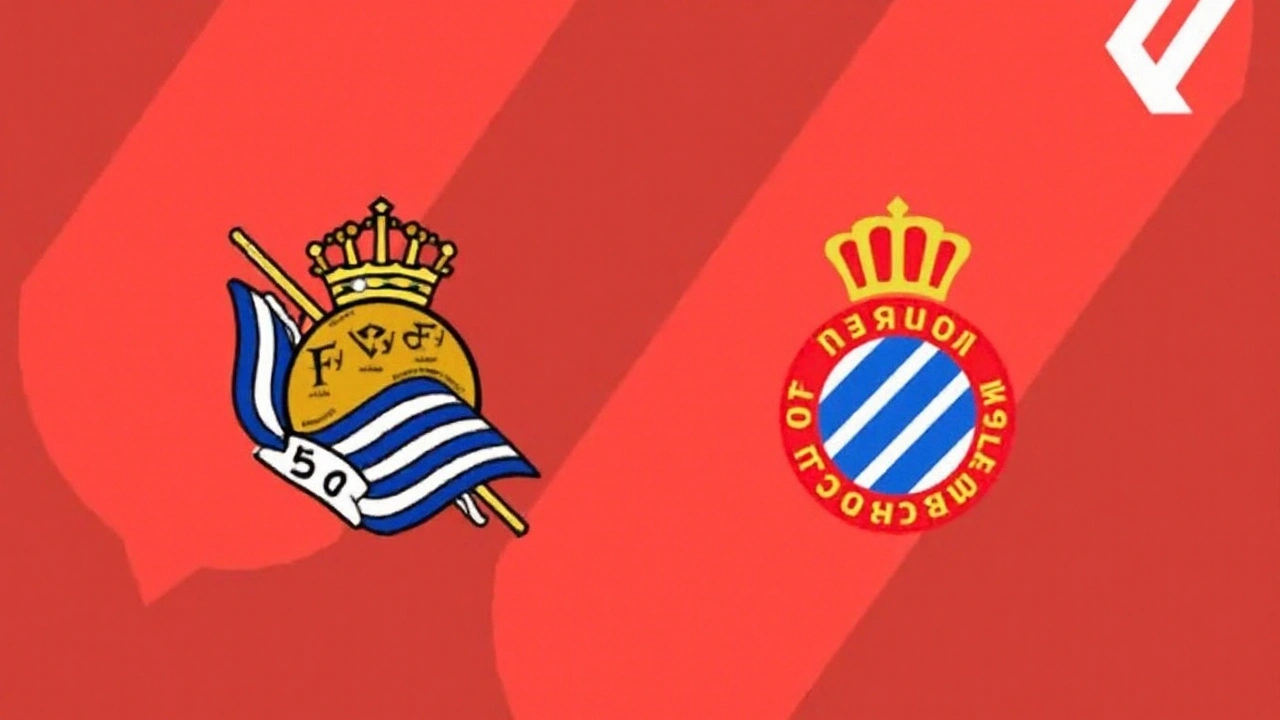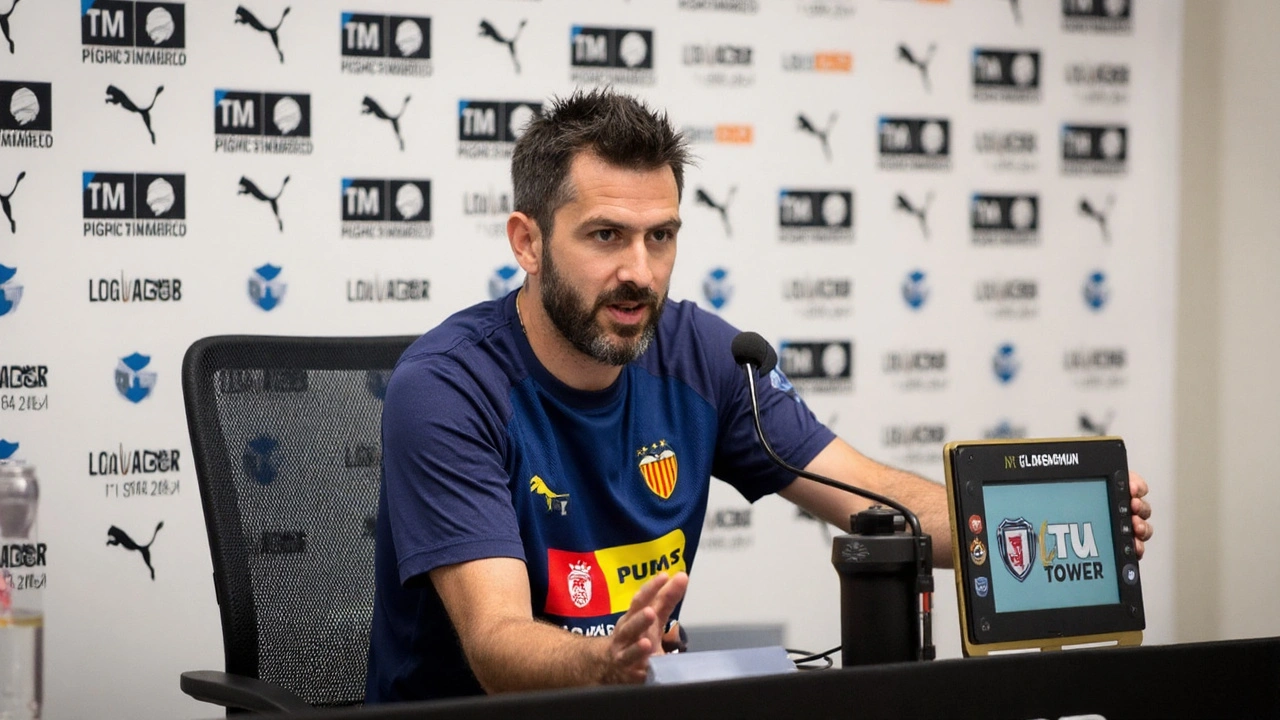Pre‑match outlook
On 22 September 2025, Valencia CF’s head coach Carlos Corberán faced journalists before the team’s trip to the RCDE Stadium for a LaLiga encounter with RCD Espanyol. The atmosphere was tense – Valencia sit mid‑table, while Espanyol have figured out a formula that’s only cost them a single defeat, that loss coming against Real Madrid on the road.
Corberán didn’t hide his admiration for the Catalan side’s leader. “Manolo González is a great coach,” he said, noting the Spaniard’s role in guiding Espanyol back to the top flight and cementing a distinctive brand of play. “Last season they struggled, but they rebuilt with a clear style that’s now fully embedded. Their early‑season surge isn’t accidental; it’s the fruit of hard work and smart signings.”
He added that Valencia holds the club in high regard, applauding the way Espanyol develop talent and adapt tactics. The manager’s comments set the tone for a nuanced preview – respect for the opponent coupled with a clear call for his own squad to evolve.

What needs to change for Valencia
Corberán was blunt about the team’s Achilles’ heel: performances away from the Mestalla. “We know we have to raise our competitive capacity when we’re not on home soil,” he admitted. The coach highlighted three key areas that must improve:
- Mental resilience – players need to stay focused despite hostile crowds and unfamiliar pitch conditions.
- Tactical flexibility – Valencia must adapt their game plan quickly if Espanyol’s high‑press disrupts their rhythm.
- Physical intensity – matching the pace of a side that has only slipped once this season demands higher stamina and quicker transitions.
He warned that underestimating Espanyol would be a mistake. “They’ve only lost one match, and that was away at Real Madrid. It shows they can handle pressure. We must prepare mentally and physically for a fast, intense contest.”
Corberán also stressed the need for Valencia to be a “recognisable and competitive side” – a phrase that hints at both an attractive playing style and consistent results. He expects his players to show grit, keep possession under pressure, and exploit the occasional defensive lapses Espanyol might reveal.
While the coach praised the opposition, his underlying message was clear: Valencia must evolve, especially when traveling. The upcoming fixture serves as a litmus test for the squad’s ability to grow beyond home comforts and contend with the league’s upper echelons.


Purna Chandra
Ah, the age‑old lament of Valencia’s itinerant woes-it reads like a tragic opera penned by an over‑caffeinated dramaturge. Corberán’s candor about away‑form is refreshing, but one suspects he masks a deeper crisis of identity with platitudinous bravado. The Catalan maestros at Espanyol, no doubt, relish this spotlight, for their ascendancy is a masterclass in calculated risk‑taking. Yet, Valencia’s fans deserve more than platitudes; they deserve a concrete blueprint, not just lofty exhortations. Ultimately, the clash will expose whether rhetoric can survive the harsh glare of the RCDE stadium.
Mohamed Rafi Mohamed Ansari
In my professional assessment, the strategic emphasis on mental resilience is of paramount importance. While the coach articulates this point with clarity, there appears to be a dearth of empirical data to support its efficacy in the short term. Moreover, the tactical flexibility mentioned is essential, yet it requires a thorough analysis of player adaptability. It is my recommendation that the club implements a systematic review of training methodologies, ensuring alignment with the envisaged playing style. I trust these observations will prove beneficial to the coaching staff.
अभिषेख भदौरिया
It is heartening to witness such a candid appraisal of the squad’s shortcomings, for acknowledgment is the first step toward metamorphosis. The emphasis on physical intensity resonates profoundly, as the sport itself is a crucible of endurance. One might contemplate that the collective psyche, when fortified, can transcend the vicissitudes of hostile environments. Therefore, fostering a culture of unwavering resolve could serve as the crucible wherein Valencia forges its newfound identity. May the team’s endeavors be guided by both wisdom and perseverance.
Nathan Ryu
There’s a subtle moral calculus at play when a manager publicly admits his team's frailties; it’s both commendable and a sign of desperation. Fans might applaud the honesty, yet they also crave tangible solutions, not merely philosophical musings. The reality is that mid‑table clubs often oscillate between ambition and stagnation, and without decisive action, Valencia risks becoming a perpetual by‑stander. In short, talk is cheap-deliver the performance.
Atul Zalavadiya
One must not be fooled by the veneer of optimism that coats Corberán’s pronouncements; beneath lies a labyrinth of systemic infirmities that demand immediate remediation. The triad of mental resilience, tactical elasticity, and unrelenting stamina forms a tripod upon which any credible campaign must be built, yet the current scaffolding appears precarious at best. It is incumbent upon the coaching cadre to transcend perfunctory drills and embed a culture of relentless pressure, akin to a relentless tide eroding even the most steadfast cliffs. Only through such merciless dedication can Valencia hope to dismantle the shackles that have hitherto confined them to the peripheries of greatness. In essence, the onus lies not merely on the players but on the entire footballing ecosystem surrounding them.
Amol Rane
While the eloquence is noted, one wonders if such verbosity translates into actionable change on the pitch.
Venkatesh nayak
Corberán’s acknowledgment of the away‑game deficiency is a step forward, yet the execution remains to be seen. It would be prudent for the technical staff to devise concrete scenarios that simulate hostile environments during training.
rao saddam
Listen up!! Valencia cannot keep hiding behind the comforts of Mestalla-everyone knows that!! The team must hit the road with a ferocious mindset and unleash a relentless press!! No excuses!!
Prince Fajardo
Oh, brilliant strategy-just scream louder at the opposition and hope they’re scared enough to drop the ball. That’ll definitely win you the match, right? 🙄
Subhashree Das
Corberán’s speech is a textbook example of empty rhetoric, designed to placate an increasingly impatient fanbase while offering zero substance. The so‑called “mental resilience” is a laughable buzzword that masks a glaring lack of tactical acumen. If the club continues to indulge this veneer of positivity without overhaul, the inevitable decline will accelerate.
jitendra vishwakarma
Good points, but will they stick?
Ira Indeikina
Indeed, the crux lies not merely in articulating objectives but in embedding them within the daily rigor of the squad’s routine. A solitary point of contemplation, however, becomes moot if not reinforced through structured drills, psychological workshops, and measurable performance metrics. It is through this holistic integration that theoretical concepts blossom into tangible results on the pitch. Consequently, the onus falls upon both the coaching hierarchy and the players to internalize these tenets, thereby transforming fleeting ideas into lasting progress.
Shashikiran R
It is indefensible for a club of Valencia's stature to continue tolerating such mediocrity; the fans deserve better, and the sport itself suffers when tradition is undermined by complacency.
SURAJ ASHISH
Same old talk, no real change.
PARVINDER DHILLON
Let’s keep the dialogue constructive and hope the team finds the right balance-both mentally and physically-so they can turn these challenges into opportunities. 😊
Nilanjan Banerjee
When one surveys the annals of Valencia’s storied legacy, it becomes evident that resilience is not merely a statistical footnote but the very marrow of its identity. The current admonition by Corberán, therefore, carries the weight of centuries, echoing the whispers of legend and the cries of fervent supporters alike. Yet, the exigency he articulates-mental fortitude, tactical pliability, and boundless stamina-mirrors the trinity of virtues extolled by the ancient philosophers who championed the harmony of body, mind, and spirit. It is within this crucible of expectation that the squad must forge its next epoch, lest it be consigned to the oblivion of forgotten glories. The specter of away‑game frailty haunts the Mestalla, a phantom that only dissipates when confronted with unwavering resolve. Moreover, the press of Espanyol, with its relentless cadence, serves as both challenge and catalyst, daring Valencia to transcend the inertia of complacency. In navigating this gauntlet, the players must internalize a philosophy wherein each pass is a manifesto, each tackle a proclamation of intent. The coaching staff, in turn, must curate sessions that simulate the cacophony of hostile stands, thereby inoculating the team against fear. Such preparation is not a mere tactical adjustment; it is an ontological rebirth, a metamorphosis from passive participants to assertive architects of destiny. As the calendar ticks toward the fateful encounter, the collective psyche of the club must coalesce around a singular, inexorable vision: dominance on foreign soil. Failure to manifest this could herald a precipitous decline, an erosion of the club’s prestige that would reverberate through generations. Conversely, triumph would not only vindicate Corberán’s pronouncements but also rekindle the flame of pride that burns within the hearts of all who don the orange jersey. Thus, the impending clash stands as a litmus test, a crucible wherein theory will be measured against the unforgiving reality of the pitch. In the final analysis, the onus rests upon each individual-player, coach, supporter-to rise above the murmurs of doubt and sculpt a narrative worthy of Valencia’s illustrious heritage. Only through collective belief can Valencia rewrite its destiny.
sri surahno
The notion that a single speech can rectify entrenched shortcomings is, frankly, a narrative woven by those seeking to obfuscate deeper conspiracies within the club’s hierarchy.
Varun Kumar
Corberán’s pep‑talk is a smokescreen; the real issue lies in the club’s mismanagement and lack of strategic vision.